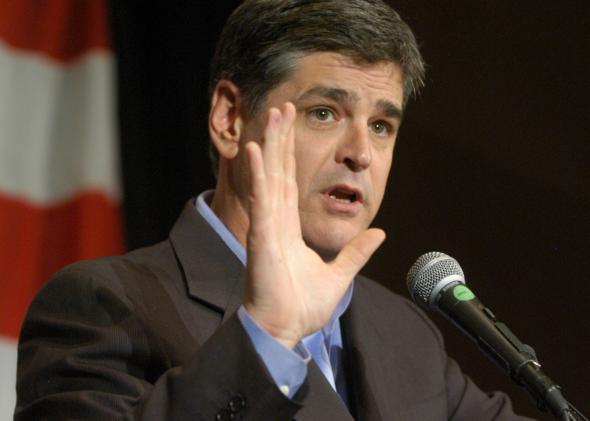Law-and-Order vs. Overkill: The Conservative Response to #Ferguson

Photo by Barry Williams/Getty Images
This blog has defined "Hannitization" as the method of cleaning up a messy situation by doing a soft-touch interview with Fox's Sean Hannity. (Hannity himself uses the verb "Hannitize" to describe the act of being convinced by him. Really, he does.)
Hannitization is not confined to raw politics. Last night, around the time that two journalists were being arrested for failing to flee a locked-down McDonald's quickly enough, Hannity got an exclusive with Ferguson's police chief, Thomas Jackson. Now, the slow and stingy flow of information from Jackson's office is a real issue on the ground. The name of the officer who killed Michael Brown has not been released. The police department has not said whether eyewitnesses who have been talking to the media have been interviewed by police, too. And while it's not the key issue in the Brown case, the heavy militarization of the police forces, a trend that had been covered by the libertarian journalist Radley Balko and the Pulitzer winner Matt Apuzzo, has broken out as a controversy.
Hannity asked about none of this.
Indeed, the whole interview is a chance for Jackson to reiterate that the cops are doing the right thing. Here's how it ends:
HANNITY: You are certain that an altercation occurred and a shot was fired within the car, meaning Mr. Brown was in the car at some point?
JACKSON: He was, he was -- yes.
HANNITY: In other words, he wasn't handcuffed in the car. He went in the car of his own volition.
JACKSON: Yes.
HANNITY: And do you believe there was a struggle for that gun?
JACKSON: That's what the county police chief said in his opening statement. He's the one that took the -- his officers are the ones that took the statement from both the officer and the witnesses.
HANNITY: What about the unrest that has taken place now in your city? Do you believe a lot of the looting and a lot of what has happened is a result of outside agitators, as some have suggested, or do you think this is just a community angry at what happened?
JACKSON: No, it's a lot of outside agitators that are causing the violence. We've had some -- several very peaceful protests. I mean, they're angry. They want -- they have questions they want answers to. And I understand that. I get that.
Outside agitators! That's a whip-smart line to use on Fox News, which ran so much footage of the New Black Panther Party's bumbling 2008 "protection" of a Philadelphia polling place, and the subsequent legal cases against the NPP, that the Panthers practically qualified for the Screen Actors Guild.
Hannity's warm-milk interview gets at a division in conservative America. I mentioned that the reporter who's been on the "militarized police" beat the longest is Radley Balko. (While at the Cato Institute, in 2006, he published a paper on paramilitary police raids.) And in a popular column for National Review, Charles C. Cooke argued that the conservatives trying to change the subject in Ferguson to black-on-black crime are making themselves and their peers sound callous. "The question of who guards the guardians pertains now as keenly as it ever has," he wrote. "The Right’s answer should be 'we do' — and we’re happy to hang them high if we know that they have transgressed."
The absence of President Obama from the conversation is one reason that the pro-cop, change-the-subject argument has been limited largely to buffoons. Yes, he put out a statement about Brown, and Todd Starnes, a Fox News commentator who can be counted on to react to events in a stupid way, asked why Obama didn't say anything about the police officer. (You know, the one whose name isn't being revealed.) But Obama has been on vacation, and taken his lumps, in a marked contrast to his quick, televised response to the killing of Trayvon Martin. That response, as Ta-Nehisi Coates pointed out, fired the starting gun on conservative media coverage of Martin as a thug who was up to no good and could have killed a guy.
The modern GOP, the one that elected Richard Nixon and bult its base in the South and the suburbs, established early on that it was the "law and order" party. The crime waves of the 1960s and 1970s and the crack wars of the 1980s were crucial to Republican dominance, and led to tough-on-crime legislation that's still on the books. Only recently, as violent crime rates have tumbled, has the libertarian tendency of the GOP reasserted itself. We've seen the "Right on Crime" Republican legislators pass prison reform bills; we've seen Rand Paul talk about restoring the voting rights of felons, and shrinking the number of crimes that can be classified as life-ruining felonies.
It's an open question: Which of these tendencies will characterize the conservative response to Ferguson? The law-and-order tendency that assumes the cops pointing their guns at protesters are preventing the outside agitators from doing something wild? Or the libertarian tendency that asks if you really want a photo of the occupation of Crimea to be indistinguishable from a photo of the St. Louis metro area?
